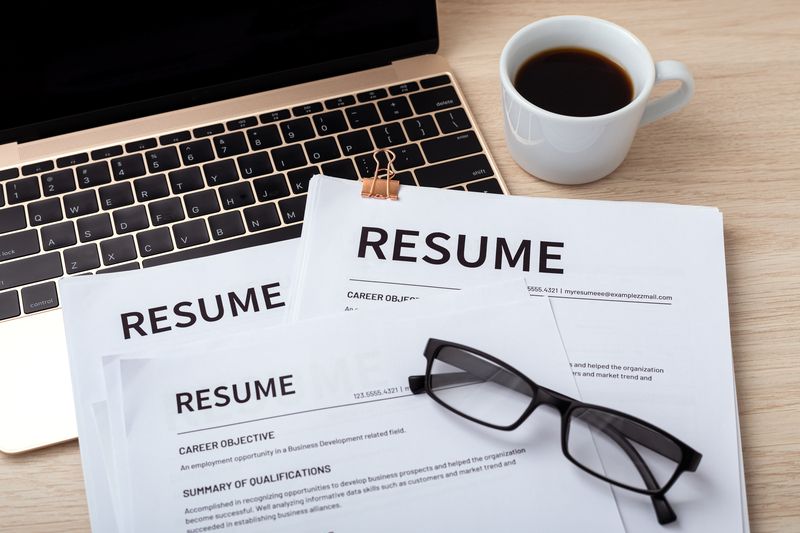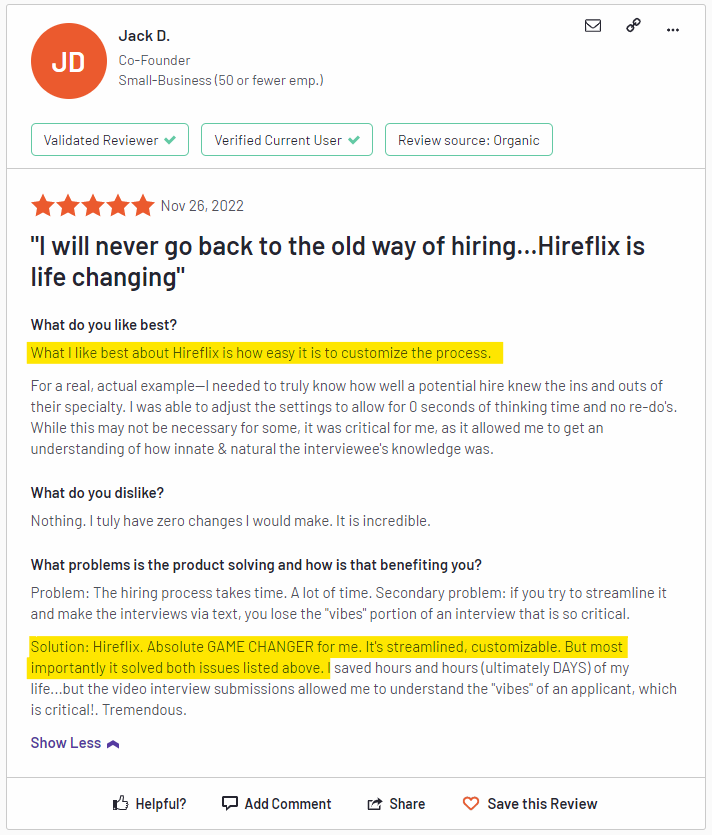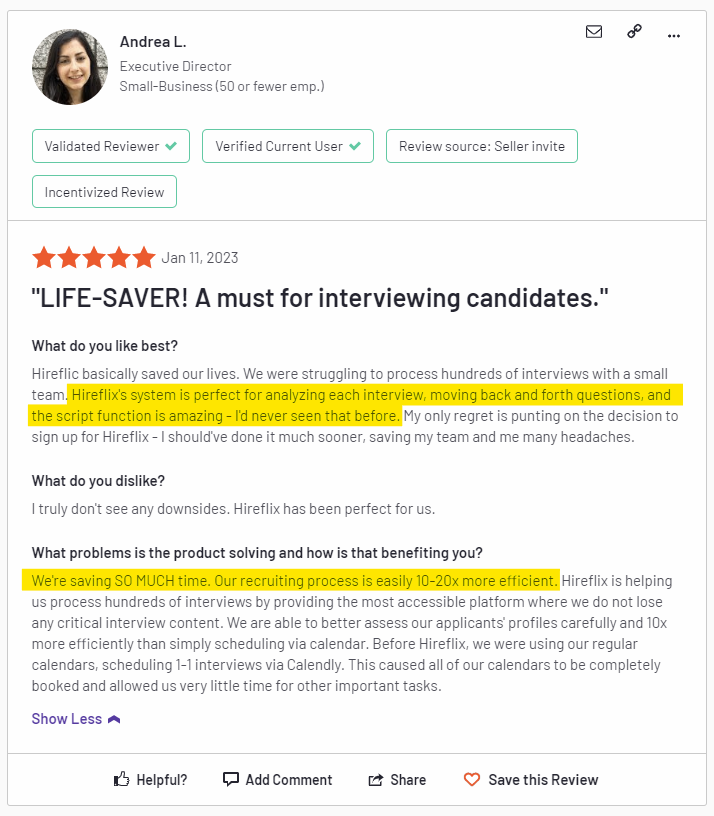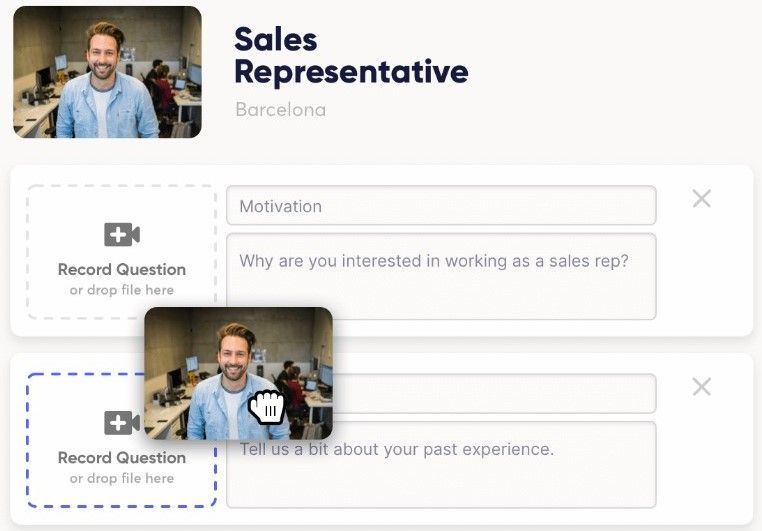Leverage the Power of the Pre-Screening Interview to Fill Open Positions—Fast!

Hiring is a time-consuming process, and, honestly, it can feel like more than any one person or team should have to handle. If you’re feeling this overwhelm, a pre-screening interview may just be the solution.
Adding a pre-screening interview to your talent acquisition strategy can weed out unqualified, unlikely, or uninterested candidates and streamline your entire hiring process, thereby simplifying every step down the line.
Methods for pre-screening interviews include phone calls, questionnaires, portfolio reviews, assessments, video interviews, and one-way video interviews (often referred to as asynchronous interviews).
But to get the most out of pre employment screening, you need to find the method and ask the questions that will save you the most time and improve your hiring effectiveness.
At first, it may seem improbable for pre-screening to save time and increase effectiveness. But when you start by choosing the proper methods and asking the right questions, your in person interviews (and the rest of your hiring process) become 1000x more efficient.
The good news for hiring managers and recruiters is that adding a pre-screening interview to your recruitment process is easier than you think.
In this post we will discuss those methods and questions that will streamline your hiring process and give you back some much needed time.
What Is a Pre-screening Interview?
A pre-screening interview is an assessment of job seekers that takes place before an official interview is even scheduled.
Pre-screening, or candidate screening, helps weed out unqualified candidates early on in the recruiting process so that you can focus your limited time on the best and brightest.
Why Implement Pre-screening Interviews?
To some people, pre-screening interviews just sound like extra work. An interview before the official interview? Tack on an additional task to the to-do list.
In reality, the opposite is true.
A pre-screening interview will actually lighten your hiring workload exponentially and bring added benefits as well.
Discover More Information
Anyone who has worked in recruitment knows that someone can look perfect on paper and come across very differently in person.
That’s because resumes never tell the full story.
A job candidate with all the right qualifications could be missing soft skills or—on the other end of the spectrum—might have left off vital details about themselves that make them more interesting as a potential candidate for hire.
The bottom line: someone who doesn’t have a killer resume might impress you in a different way during the pre screening process.
Pre-screening is an important information-gathering tool. When done well, it can help flesh out what’s not on a resume. Sometimes candidates focus so narrowly on the responsibilities listed in a job posting, that they neglect to include other qualifications they have that could put them over the top. (Chron)
Pre screening interviews are a good way to ensure that you’re focusing your time on the best applicants—period.
Weed Out People Who Don’t Fit
Resumes are great starting points to get to know a job applicant, but sometimes all it takes are a few pointed interview questions from the hiring manager to start poking holes in the facade a slick resume can create.
A well-crafted pre-screening interview can weed out candidates that might be “qualified”, but simply would not be a good fit for the particular position within your company or your existing teams, either because of skills, personality, values, or anything of that nature.

Save Time
By instituting a pre-screening interview phase before the in person interview phase, you have a system in place to quickly narrow your pool of candidates, ensuring that any interviews you do schedule from that point on are more likely to be productive and end in hiring.
This approach can keep you from spinning your interview wheels, wasting time on candidate after unqualified candidate.

Reduce Turnover
Because pre screening candidates can lower your chances of hiring the wrong person, pre-screening methods are correlated with reduced turnover.
According to recent research, companies that institute pre-screening interviews enjoy a 39% lower turnover rate than their counterparts.
Methods for Conducting Pre-screen Interviews: Pros and Cons
Thanks to advances in technologies, it’s easier than ever to conduct pre-screening interviews. The vast majority of them don’t even need to be conducted in person. That doesn’t mean, however, that there aren’t pros and cons to consider with each method.
One-Way Video Interview
One-way video interview software allows you to collect pre-screening interviews quickly and painlessly. The goal of these interviews is to quickly identify which candidates are suitable to then take to a live interview.
Pros:
- You can create a standard set of pre screening questions and the candidate answers them over video at their convenience.
- You can judge skills such as communication, attitude, language, etc. in ways impossible to judge through a CV or over the phone
- No scheduling required!
- You can share the videos with your team and compare notes.
- You can build trust and empathy with candidates from an early stage in the process thanks to the intro videos, or even asking questions with video
Cons:
- No chance to judge how a candidate interacts with others.
- No chance to ask follow-up questions in the moment.

Video Interview
Meeting candidates for a live, two-way video interview might be the right choice for you and your needs.
Pros:
- Interact directly with candidates and better determine if their personality is a good fit for your company or the open position.
- Enjoy the ability to use your pre-screening questions as a framework but pivot questions if necessary.
Cons:
- The ability to pivot your interview questions could send you off track and potentially derail the interview, extending the total interview time.
- Two-way video interviews have to be scheduled, making them more time-consuming to arrange.
- You have only so many hours in a day to schedule these hence there's no way you will be able to do this at scale
Phone Screen Interview
Phone interviews for pre-screening have positives and negatives.
Pros:
- Being able to gauge personality directly.
- Ability to pivot questions as in a live video screening.
Cons:
- Pivoting phone interview questions could lead to pre-screenings taking too long.
- Phone calls mean you can’t see how candidates present themselves.
- Screenings would need to be scheduled directly.
- Same as with live interviews, you only have so many hours in a day to schedule these hence there's no way you will be able to do this at scale
Questionnaire
You may choose to send a screening questionnaire for candidates to complete and return.
Pros:
- Questionnaires are quick and easy, both to create and complete.
- This process can help determine what—if anything—was missed on a resume, whether good or bad.
Cons:
- You neither see the candidates nor hear from them in their own voices.
- Questionnaires do not help you determine whether a candidate’s personality is a good fit for the company or position.
Sending a Quiz or Requesting Portfolios
You may choose either to send a quiz or request a portfolio as a pre-screening requirement.
Pro:
- A quiz or portfolio can help determine what a candidate knows and if they can perform the work necessary for the task especially for positions in the design field etc.
Con:
- Much like the resume (and the questionnaire option above), these are impersonal methods that do not allow you to judge personality or temperament.
Pre-Screening Interview Questions
During a pre-screening interview, you can ask general, personal, and specific job questions.
General Questions
These help you get a handle on a job seeker’s employment history, skills, and qualifications.
- Can you briefly explain your background and what experience you have that makes you an excellent candidate?
- What are your skills and weaknesses?
- What about this position drew you to apply?
- What do you know about our company?
Personal Questions
Personal questions help you measure personality and temperament.
- What didn’t you like about your last job?
- How do you deal with a stressful situation?
- What hobbies do you have?
- Do you prefer working on a team or independently?
Specific Job Questions
Such questions help you see if the candidate suits the role and work environment for which they’re applying.
- What goals do you have within the next five years?
- What would you like to accomplish while you hold this position?
- What direction would you like to see this team/department move in the future?
- What are your salary expectations?
How to Process the Information from Pre-Screen Interviews
Without a system in place, processing pre-screening information could feel overwhelming, especially if you have specific recruitment KPIs to hit.
We suggest setting up a series of questions by which you can judge all candidates' pre-screen interviews consistently.
A few questions to consider within your hiring team as you process prescreening interviews:
- How did the job seeker present themselves? If the screening interview makes it obvious that candidates weren’t prepared or were late, they may lack the enthusiasm you're looking for in a new candidate. Likewise, if they seemed frazzled, bored, or distracted during the screening, they’re likely easy to eliminate before moving on to the official interview phase.
- Does the job seeker’s personality align with the team or corporate culture? Personality fit plays a big role in position success—much too big to overlook. A good match between personality traits and organizational culture plays a huge role in teamwork and overall job satisfaction. Pre-screening interviews are a great way to look for signs of potential alignment.
- Do the job seeker’s personal goals and requirements align with the position and the company? There’s so much more that goes into being “a good fit” for a position than the mere ability to do the work. Matching visions, goals, and energies between employer and employee can create a synergistic effect by which individual job candidates and the companies that hire them can experience exponential benefits.
By conducting pre-screening interviews—particularly easy-to-collect one-way video interviews—companies can leverage the power of video technology to streamline their interview process, save time, and quickly hone in on the best candidates for the job, and fill open positions fast.
Hireflix can help in today’s fast-paced working environment, where pre-screening interviews are essential. This is especially true when you’re conducting high volume hiring.
Fortunately, Hireflix has the tools you need to streamline the process and make it feel easy.
Learn more about how Hireflix makes the pre screening interview process lightning fast.

